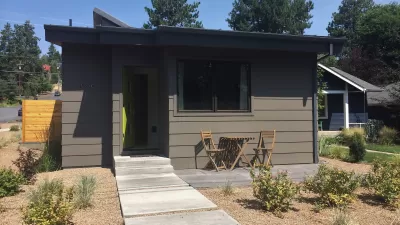Spirited protests weren't enough to stop the Montgomery County Council from allowing accessory dwelling units (ADU) in parts of the county.

"The Montgomery County Council on Tuesday unanimously passed a zoning change allowing accessory dwelling units (ADUs), also known as in-law apartments, in three residential zones of the county," reports Dan Schere.
"The zoning change will allow the apartments as attached and detached structures in zones where the minimum lot size is 6,000 to 20,000 square feet," adds Schere. "Attached ADUs must be limited to 10% of the lot area and less than 1,200 square feet. Detached ADUs must be less than 1,200 square feet except when occupying a basement."
County Planning Director Gwen Wright is quoted in the article saying the county could expect the development of about 100 ADUs per year.
The zoning change proposal sparked controversy and even protests on its way to approval. Rebecca Tan reported the day before the council approval about protestors wielding hand-made signs marching into the Montgomery County Council headquarters. County Executive Marc Elrich opposed the bill, too, "on the grounds that it would lead to increased traffic in neighborhoods and school crowding and cause aesthetic problems related to increased storm water runoff."
FULL STORY: Council Passes Accessory Apartment Zoning Change

Trump Administration Could Effectively End Housing Voucher Program
Federal officials are eyeing major cuts to the Section 8 program that helps millions of low-income households pay rent.

Planetizen Federal Action Tracker
A weekly monitor of how Trump’s orders and actions are impacting planners and planning in America.

The 120 Year Old Tiny Home Villages That Sheltered San Francisco’s Earthquake Refugees
More than a century ago, San Francisco mobilized to house thousands of residents displaced by the 1906 earthquake. Could their strategy offer a model for the present?

HSR Reaches Key Settlement in Northern California City
The state’s high-speed rail authority reached an agreement with Millbrae, a key city on the train’s proposed route to San Francisco.

Washington State Legislature Passes Parking Reform Bill
A bill that would limit parking requirements for new developments is headed to the governor’s desk.

Missouri Law Would Ban Protections for Housing Voucher Users
A state law seeks to overturn source-of-income discrimination bans passed by several Missouri cities.
Urban Design for Planners 1: Software Tools
This six-course series explores essential urban design concepts using open source software and equips planners with the tools they need to participate fully in the urban design process.
Planning for Universal Design
Learn the tools for implementing Universal Design in planning regulations.
Ada County Highway District
Clanton & Associates, Inc.
Jessamine County Fiscal Court
Institute for Housing and Urban Development Studies (IHS)
City of Grandview
Harvard GSD Executive Education
Toledo-Lucas County Plan Commissions
Salt Lake City
NYU Wagner Graduate School of Public Service





























